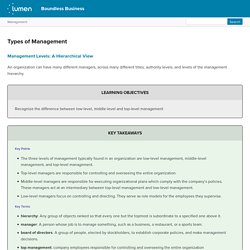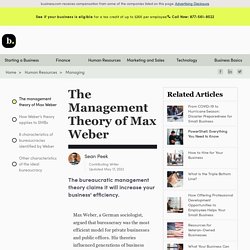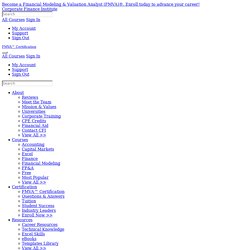

Management Theories. Classical Theory of Management. Classical management theory is based on the belief that workers only have physical and economic needs.

It does not take into account social needs or job satisfaction, but instead advocates a specialization of labor, centralized leadership and decision-making, and profit maximization. Designed solely to streamline operations, increase productivity and enhance the bottom line, this idea arose in the late 19th century and gained prominence through the first half of the 20th century. While not widely subscribed to in modern times, this theory offers some principles that remain valid, to an extent, in small business settings in regards to manufacturing. Concepts of the Ideal Workplace The theory outlines an ideal workplace as one that rests on three main concepts: Three Levels of Management. Management Levels: A Hierarchical View An organization can have many different managers, across many different titles, authority levels, and levels of the management hierarchy.

Learning Objectives Recognize the difference between low-level, middle-level and top-level management Key Takeaways. Popular Management Theories Decoded. Management is both an art and a science.

Most modern day workplaces employ multiple management theories to ensure optimal employee output. Download Infographic Until the day computers are able to think, learn and feel emotions, humans will probably be the most complicated assets to manage. Error-free performance from a printer or fax machine but you can't expect the same thing from a human.
On the other hand, there are many things that machines just aren't capable of, which makes human assets unexpendable. Theorists have long speculated on what type on management is best for humans in the professional setting. Editor's Note: Looking for Performance Management Software for your business? In this infographic, we look at the basics of the six most popular management theories: Download it below to learn more! Business.com Editorial Staff Like this article? Be part of Business.comAlready a member? Management Theory of Douglas McGregor. Human Relations Management Theory Basics. By nullplus The human relations theory of management began development in the early 1920's during the industrial revolution.

At that time, ... The human relations theory of management began development in the early 1920's during the industrial revolution. At that time, productivity was the focus of business. Professor Elton Mayo began his experiments (the Hawthorne Studies), to prove the importance of people for productivity - not machines. The human relations management theory is a researched belief that people desire to be part of a supportive team that facilitates development and growth. 1. 2. 3. The Management Theory of Max Weber. Photo credit: Biography.com While Weber's theory prioritizes efficiency, it isn't necessarily the best practice for leaders to implement.

Max Weber was unlike most workplace leaders today. Management Theory of Henri Fayol. 14 Principles of Management by Henri Fayol. The Management Theory of Frederick Taylor. Management Theory: Ludwig von Bertalanffy - General System Theory. General system theory, therefore, is a general science of wholeness...

The meaning of the somewhat mystical expression, “The whole is more that the sum of its parts” is simply that constitutive characteristics are not explainable from the characteristics of the isolated parts. The characteristics of the complex, therefore, appear as new or emergent... - Ludwig von Bertalanffy Systems theory was proposed in the 1940's by the biologist Ludwig von Bertalanffy and furthered by Ross Ashby (1964). Von Bertalanffy was reacting against both reductionism and attempting to revive the unity of science.
He is considered to be the founder and principal author of general systems theory. If one were to analyze current notions and fashionable catchwords, he would find “systems” high on the list - Ludwig von Bertalanffy von Bertalanffy (1968) wrote that a system is a complex of interacting elements and that they are open to, and interact with their environments. Next Steps ADDIE Timeline Reference. Management Theories - How Modern Organizations Manage People. Management theories are concepts surrounding recommended management strategies, which may include tools such as frameworks and guidelines that can be implemented in modern organizationsCorporate Structure.

Generally, professionals will not rely solely on one management theory alone, but instead, introduce several concepts from different management theories that best suit their workforce and company cultureGroupthink. At a Glance Until the day that machines are able to think, talk, and experience emotions, humans will remain the most complicated beings to manage. Humans can never achieve the kind of error-free performance that machinesPP&E (Property, Plant and Equipment) provide. Design Models for Management Systems Design and Inquiry. Design brings forth what does not come naturally.

While science is concerned with how things are, design is concerned with how things ought to be. “Everyone designs who devises courses of action aimed at changing existing situations into preferred ones. The intellectual activity that produces material artifacts is no different fundamentally from the one that prescribes remedies for a sick patient or the one that devises a new sales plan for a company or a social welfare policy for a state.” - Herbert Simon (Nobel Prize Winner & Carnegie Mellon professor)
4 Kinds of Managers and How to Handle Them. In any workplace, there will always be a boss.

That boss might be you; it might not. When you’re in production, a manager will always be behind your back, looking and observing how well you do, giving you responsibilities and feedback, and being the person you report to. But it’s not a one-sided relationship. Your boss will always have something to say to you; the good managers will ask for positive or negative feedback on how they are as a leader and co-worker. However, there are bad managers, too. Let’s face it: Managers are also human beings with dreams, hopes, ambitions, problems, and challenges. Yes, to both. 1. How They Are: Micromanagers always want their instructions followed—to the letter. How to Deal with Them: A micromanager is often needy with control because of insecurity. 2. How They Are: They are typically the ones who, like their type name, consult before making decisions. 3.